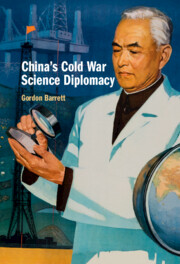Book contents
- China’s Cold War Science Diplomacy
- China’s Cold War Science Diplomacy
- Copyright page
- Dedication
- Contents
- Tables
- Acknowledgements
- Note on the Text
- Abbreviations
- Introduction
- 1 A Scientific United Front at Home and Abroad
- 2 Between Pugwash and the Party-State
- 3 ‘Friends and Comrades, We Fight against Imperialism’
- 4 Linking the Local, National, and International
- 5 A Spectrum of Propaganda and Scientific Exchange
- Conclusion
- Select Bibliography
- Index
2 - Between Pugwash and the Party-State
Scientists, Agency, and Transnational Activism in the Early Pugwash Conferences on Science and World Affairs, 1955–1960
Published online by Cambridge University Press: 18 August 2022
- China’s Cold War Science Diplomacy
- China’s Cold War Science Diplomacy
- Copyright page
- Dedication
- Contents
- Tables
- Acknowledgements
- Note on the Text
- Abbreviations
- Introduction
- 1 A Scientific United Front at Home and Abroad
- 2 Between Pugwash and the Party-State
- 3 ‘Friends and Comrades, We Fight against Imperialism’
- 4 Linking the Local, National, and International
- 5 A Spectrum of Propaganda and Scientific Exchange
- Conclusion
- Select Bibliography
- Index
Summary
Elite Chinese scientists’ prominence within the World Federation of Scientific Workers during the 1950s opened many new opportunities for those scientists and the Chinese party-state alike. Examining the origins and evolution of the on-again off-again relationship between China and the early Pugwash Conferences on Science and World Affairs, Chapter 2 discusses the decision-making processes and key episodes that shaped this relationship. From Chinese policymakers and officials’ internal debates over the Russell-Einstein Manifesto in 1955 through to the end of Mao-era engagement with Pugwash at the fateful Moscow Conference in 1960, Chinese involvement in Pugwash during this period shows the shifting dynamic tension created by a system in which foreign policymakers expected scientists to act as state agents in their international activities. Much of the time, this saw senior Chinese Communist Party leaders or foreign relations officials able to actively shape the Chinese side of these international encounters; however, particularly in the case of those taking place in person and overseas, scientists were the ones who were carrying out the interactions, creating the potential for them to exercise some agency in how they were conducted and reported back.
Keywords
- Type
- Chapter
- Information
- China's Cold War Science Diplomacy , pp. 58 - 98Publisher: Cambridge University PressPrint publication year: 2022



